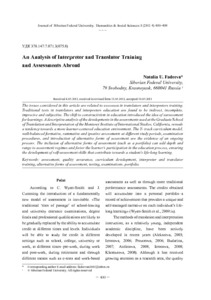Из зарубежного опыта оценивания уровня подготовки переводчиков
Скачать файл:
URI (для ссылок/цитирований):
https://elib.sfu-kras.ru/handle/2311/2266Автор:
Фадеева, Н.Ю.
Fadeeva, Natalia U.
Дата:
2011-03Аннотация:
Статья посвящена подготовке переводчиков и месту системы оценивания в программах
обучения переводчиков. Конструктивизм - популярная за рубежом философия в образовании -
привнес новый взгляд на оценивание как инструмент повышения качества процесса обучения.
На примере учебного плана и процедур оценивания, разработанных в Школе устного и
письменного перевода (г. Монтерей, Калифорния), раскрывается потенциал альтернативных
форм оценивания для формирования компетенций лингвиста-переводчика. The issues considered in this article are related toassessmentin translators and interpreters training.
Traditional tests in translators and interpreters education are found to be indirect, incomplete,
imprecise and subjective. The shift to constructivism in education introduced the idea of «assessment
for learning». A descriptive analysis of the developments in the assessments used at the Graduate School
of Translation and Interpretation of the Monterey Institute of International Studies, California, reveals
a tendency towards a more learner-centered education environment. The Y- track curriculum model,
well-balanced formative, summative and ipsative assessments at different study periods, examination
procedures, and introduction of alternative forms of assessment are the evidence of an ongoing
process. The inclusion of alternative forms of assessment (such as a portfolio) can add depth and
range to assessment regimes and foster the learners participation in the education process, ensuring
the development of self-assessment skills that contribute towards a students life-long learning.

